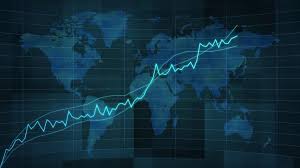How Geopolitical Shocks and Inflation Are Reshaping the Western World's Economy

For decades, the economic engine of the Western world long defined by stability, open markets, and predictable growth operated with an almost mechanical precision. The era of globalization, characterized by efficient global supply chains and a sustained period of low inflation, created a sense of economic security that many took for granted.
However, that era of certainty has come to an abrupt and profound end. Today, a complex and challenging landscape has emerged, shaped by a volatile mix of persistent, high-level inflation, a fragile post-pandemic recovery, and escalating geopolitical tensions.
The result is a new era of profound uncertainty, forcing governments, businesses, and everyday citizens to navigate an economic labyrinth where the rules of the past no longer apply.
This article will explore the forces currently reshaping the economies of the United States and Europe, a story that holds significant implications for the rest of the world.
The Perfect Storm: Geopolitics and the Cost of Living
Source: Google
The current economic turbulence cannot be understood without examining the powerful and unpredictable forces of geopolitics. Conflicts and trade disputes are no longer isolated events; they are directly impacting economic growth and fueling inflation in the United States and Europe.
The most prominent example is the ongoing conflict in Ukraine, which has sent shockwaves through the global energy and food markets. European nations, heavily reliant on Russian gas, faced a severe energy crisis, which in turn drove up costs for businesses and households alike.
This high cost of energy and raw materials acts as a powerful inflationary force, a direct consequence of a geopolitical shock.
Beyond energy, the shift towards a more fragmented global order is also a major factor. The era of frictionless trade is giving way to a new wave of protectionism and trade barriers. Nations are increasingly prioritizing "friend-shoring" or domestic production to secure critical supplies and reduce their vulnerability to external shocks.
While this may increase national security, it also disrupts decades of carefully constructed global supply chains, leading to higher costs, reduced efficiency, and a significant contribution to inflation. For businesses, this means a re-evaluation of long-held strategies, as they must now balance the benefits of just-in-time global delivery with the risks of geopolitical instability.
These disruptions ripple through the economy, affecting everything from the price of consumer goods on a store shelf to the cost of raw materials for a manufacturing plant.
The Policy Conundrum: Fighting Inflation and Avoiding Recession
Source: Google
In the face of stubborn inflation, central banks in the Western world, led by the U.S. Federal Reserve and the European Central Bank, have been forced to take aggressive action. For years, low-interest rates were the norm, designed to stimulate growth. Now, the priority is to bring inflation under control, and the primary policy tool is raising interest rates.
The logic is straightforward, higher interest rates make borrowing more expensive, which slows down spending and investment,thereby cooling down the economy and bringing prices back down.
However, this is a delicate and dangerous balancing act. The risk of overcorrection is high. If central banks raise rates too quickly or too high, they could trigger a recession and a significant decline in economic activity. The possibility of stagflation, a toxic combination of high inflation and low growth is also a growing concern. On the ground, this policy is already having a tangible impact.
The housing market is cooling as mortgages become more expensive, and businesses are reconsidering expansion plans due to higher borrowing costs. The policy choices made in Washington and Brussels will directly determine whether the West successfully lands the plane or sends the economy into a deep and painful downturn.
Governments, in parallel, are using fiscal policy to try and ease the burden on citizens. However, their options are limited. The immense spending during the pandemic to support businesses and households has led to ballooning public debts.
While some governments are offering energy subsidies or tax breaks to cushion the blow of rising prices, these measures must be carefully managed to avoid further fueling inflation.The ability of policymakers to strike this balance will be a critical determinant of economic health in the coming years. It requires political courage and a clear understanding of the new economic dynamics at play.
The Long-Term Impact: Re-shoring and Economic Prospects
Source: Google
The current turmoil is not just a temporary blip; it is accelerating long-term trends that will reshape the economic prospects of Western nations. The shift in global supply chains is a key element of this.
Companies are re-shoring or near-shoring production to bring manufacturing closer to home. This can lead to job creation in sectors that were long considered lost to globalization, but it comes at a cost.
Domestic production is often more expensive, and without the efficiency of a global supply chain, Western nations may lose some of their competitive edge.The long-term economic prospects of the Western world will depend on its ability to innovate and adapt. The focus is shifting from simple cost-cutting to building more resilient and sustainable economies.
This means investing in new technologies, such as automation and renewable energy, that can reduce reliance on volatile external markets. It also means investing in a skilled workforce that can adapt to a changing labor market.
The challenge is immense, but the opportunity to build a more secure economic future is also real. The question remains whether Western nations can pivot effectively from a globalization model to one that prioritizes resilience and self-reliance without sacrificing their long-term economic vitality.
Why This Story Matters Globally
The economic health of the Western world has a ripple effect that touches every corner of the globe. What happens in Washington and Brussels directly influences trade, investment, and financial markets in every corner of the world, including Africa.
The price of a commodity, the availability of a loan, and the stability of a currency can all be influenced by the decisions made in these capitals. This piece provides crucial context for understanding global economic trends.
It equips our readership from policymakers to entrepreneurs with the knowledge to navigate a changing global environment and make informed decisions in a world where economic stability is no longer guaranteed.
Understanding this new era of uncertainty is not just about comprehending what's happening in the West; it's about preparing for the ripple effects that will shape Africa's own economic future. The world is more interconnected than ever, and in the new economic labyrinth, every nation must be prepared to find its own way forward.
You may also like...
Margot Robbie and Colin Farrell's New Fantasy Film Faces Rotten Tomatoes Score Drop

"A Big Bold Beautiful Journey," starring Margot Robbie and Colin Farrell, is set for release on September 19, 2025, as a...
Highlander Reboot Gets 'John Wick' Level Hype from Dave Bautista and Henry Cavill

Dave Bautista has landed his dream role as The Kurgan in Chad Stahelski's Highlander reboot, a part he has passionately ...
Ozuna Dominates Latin Airplay with 33rd Chart-Topper!

Ozuna's "Sirenita" has officially become his 33rd No. 1 hit on Billboard’s Latin Rhythm Airplay chart, climbing to the t...
Music World Mourns: Hitmaker Omen Passes Away at 49

Renowned hip-hop producer Sidney “Omen” Brown has died at 49. Known for his work with Roc-A-Fella, Drake, Lil Wayne, and...
Alien: Earth Stars Spill on Episode 7's Terrifying Twists and Iconic Sci-Fi Nods

Dive into the intense world of <em>Alien: Earth</em> Episode 7, "Emergence," through interviews with Adarsh Gourav and D...
Emmys 2025 Red Carpet: The Most Stunning Celebrity Looks That Broke the Internet!

The Emmys red carpet redefined celebrity fashion, moving beyond traditional attire to embrace daring and expressive look...
Davido Takes Center Stage: Exclusive Nigerian Act for Coachella 2026!

Coachella has revealed its highly anticipated 2026 lineup, featuring headliners Justin Bieber, Sabrina Carpenter, Karol ...
M&S Autumn Collection Promises High Street Revolution with Style & Value!

Marks & Spencer is shaking up the High Street with its most daring and eclectic fashion collection, the "She's Back" cam...




